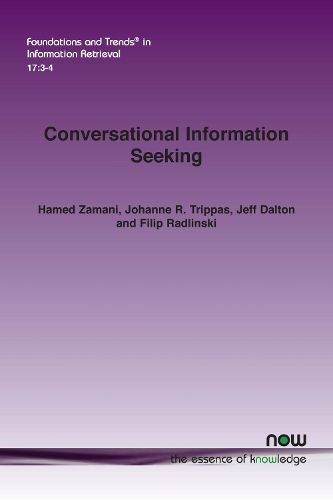Readings Newsletter
Become a Readings Member to make your shopping experience even easier.
Sign in or sign up for free!
You’re not far away from qualifying for FREE standard shipping within Australia
You’ve qualified for FREE standard shipping within Australia
The cart is loading…






This title is printed to order. This book may have been self-published. If so, we cannot guarantee the quality of the content. In the main most books will have gone through the editing process however some may not. We therefore suggest that you be aware of this before ordering this book. If in doubt check either the author or publisher’s details as we are unable to accept any returns unless they are faulty. Please contact us if you have any questions.
Over the years, information retrieval and search systems have become more conversational. The last few years have seen a tremendous acceleration of this evolution driven by progress in machine learning. Whereas the possibility of a conversational information seeking (CIS) system robustly understanding conversational input from a person was previously limited, it can now almost be taken for granted. Consumer hardware that supports and encourages conversation is now common, raising awareness of--and the expectation of--conversational support in information retrieval systems. From the research community, this has been accompanied by significant progress in defining more natural CIS tasks, metrics, challenges, and benchmarks. As these developments allowed the field to expand rapidly, this monograph aims to summarise the current state-of-the-art of CIS research, and provide an introduction to new researchers as well as a reference for established researchers in this area. This monograph provides a thorough overview of CIS definitions, applications, interactions, interfaces, design, implementation, and evaluation. The authors view CIS applications as including conversational search, conversational question answering, and conversational recommendation. Their aim is to provide an overview of past research related to CIS, introduce the current state-of-the-art in CIS, highlight the challenges still being faced in the community, and suggest future directions.
$9.00 standard shipping within Australia
FREE standard shipping within Australia for orders over $100.00
Express & International shipping calculated at checkout
This title is printed to order. This book may have been self-published. If so, we cannot guarantee the quality of the content. In the main most books will have gone through the editing process however some may not. We therefore suggest that you be aware of this before ordering this book. If in doubt check either the author or publisher’s details as we are unable to accept any returns unless they are faulty. Please contact us if you have any questions.
Over the years, information retrieval and search systems have become more conversational. The last few years have seen a tremendous acceleration of this evolution driven by progress in machine learning. Whereas the possibility of a conversational information seeking (CIS) system robustly understanding conversational input from a person was previously limited, it can now almost be taken for granted. Consumer hardware that supports and encourages conversation is now common, raising awareness of--and the expectation of--conversational support in information retrieval systems. From the research community, this has been accompanied by significant progress in defining more natural CIS tasks, metrics, challenges, and benchmarks. As these developments allowed the field to expand rapidly, this monograph aims to summarise the current state-of-the-art of CIS research, and provide an introduction to new researchers as well as a reference for established researchers in this area. This monograph provides a thorough overview of CIS definitions, applications, interactions, interfaces, design, implementation, and evaluation. The authors view CIS applications as including conversational search, conversational question answering, and conversational recommendation. Their aim is to provide an overview of past research related to CIS, introduce the current state-of-the-art in CIS, highlight the challenges still being faced in the community, and suggest future directions.